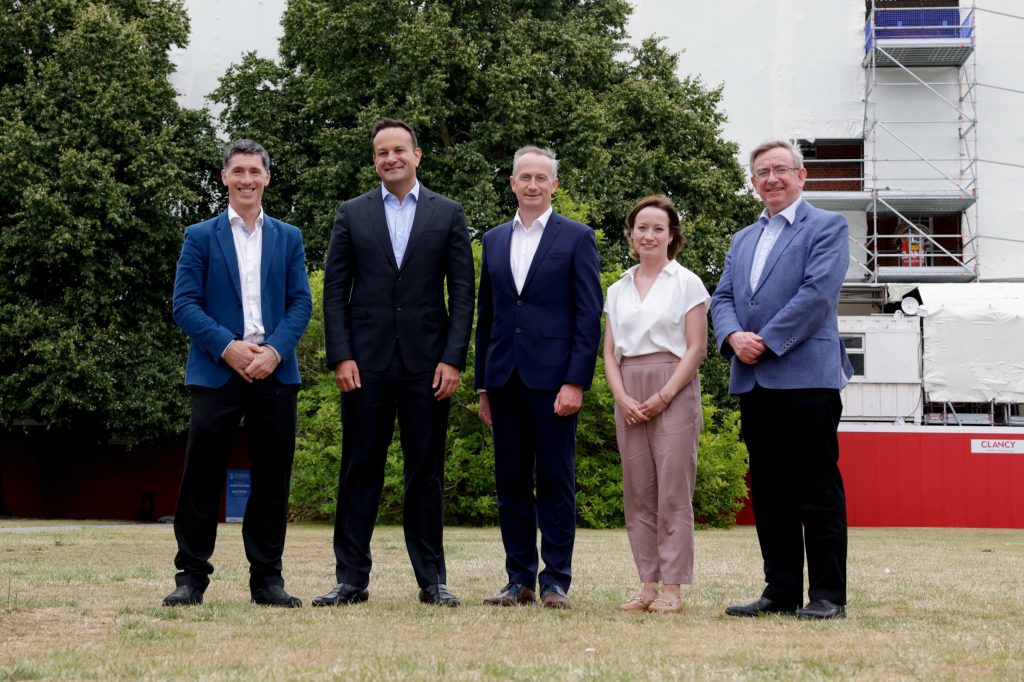
New Construction Technology Centre will move quickly to modernise Irish building practices

Dr Magdalena Hajdukiewicz, Co-Director of ConstructInnovate, Ireland’s new national Construction Technology Centre, explains to ROBBIE COUSINS how the centre will support the construction sector as a whole in transitioning to more modern and efficient construction practices.
The Construction Sector Group (CSG) was created by the Department of Public Expenditure and Reform (DPER) to ensure regular and open dialogue between the government and the construction sector and identify areas for action. Establishing a construction technology centre was a key recommendation of the CSG ‘to enable technology and innovation advancement across the sector’.
Construction Technology Centre
A consortium comprising the University of Galway, Trinity College Dublin, University College Dublin and University College Cork and the Irish Green Building Council was recently awarded the contract for the new Construction Technology Centre.
The government will provide funding of €5m over five years to the consortium to operate the new centre, which aims to accelerate research and innovation within the construction sector.
The Construction Technology Centre will bring together the whole value chain to accelerate people-centric innovation in construction and the built environment that drives the transition towards a sustainable society and economy, relying on the active engagement of its members and a European network of innovation clusters. Membership of the Construction Technology Centre is open to all construction/built environment stakeholders with an interest in the development of construction technology expertise in Ireland.
The new centre will be hosted at the University of Galway (formerly NUI Galway), and, in line with the government’s Housing for All (HfA) strategy, it will first have a particular focus on advancing innovation and productivity in residential construction.
A strong team of researchers with expertise in the main areas of digital adoption, modern methods of construction and sustainability will be organised under five pillars to address the critical areas of Productivity; Affordability and Cost; Quality and Safety; Sustainability; Skills and Training; and Collaboration.
Cutting-edge development
Speaking at the announcement of the contract, Tánaiste and Minister for Enterprise, Trade and Employment Leo Varadkar said: “The government is investing billions – substantially above the EU average – in the future, building new homes, roads, public transport, schools, hospitals and other vital infrastructure. This new Construction Technology Centre will make sure we are at the cutting edge of new developments in the sector, making sure Irish companies and the taxpayer are getting the best value for money while building this important infrastructure in the most modern and efficient way possible.”
Under the HfA strategy, the government has expanded the remit of Enterprise Ireland to work with the domestic housebuilding sector for the first time, and it will play a central role in developing the Construction Technology Centre.
Enterprise Ireland CEO Leo Clancy said the new centre will leverage the best combination of skills, equipment and know-how in the Irish research system.
Leo Clancy commented: “Through innovation, the centre will help to increase the productivity, sustainability and export potential of the construction sector while enabling reduced costs and build times for Ireland’s housing and infrastructural requirements.”
Professor Ciarán Ó’hÓgartaigh, President of University of Galway, where the centre will be based, commented, “University of Galway has made significant strides in terms of sustainability, one of our core values. It is a testament to our dedication in this area that we will host the country’s Construction Technology Centre and bring all of our talent, knowledge and expertise, and that of the higher education sector, to the fore in driving sustainability, innovation and technology transformation in the built environment sector.”
The centre directors, Professor Jamie Goggins and Dr Magdalena Hajdukiewicz, both at University of Galway, added: “Our consortium proposed a centre that will deliver on its vision to make Ireland a global research and innovation leader for sustainable construction and built environment technology. The centre will bring together the whole value chain to accelerate people-centric innovation in construction and the built environment that allows industry to increase its capacity and competitiveness while creating a sustainable society and economy.”
Vision for a Construction Technology Centre
Speaking to Irish Construction News, Dr Hajdukiewicz says that the consortium’s tender submission set out a clear vision for the centre, which will facilitate the involvement of contractors and companies of all sizes in the sector supply chain.
“The majority of contractors operating in the Irish construction sector are small businesses,” Dr Hajdukiewicz explains. “We will be looking to work with contractors, subcontractors and suppliers of all sizes to help them address the challenges they face.”
She adds that much of the preparation work for the centre had been done in recent years by the Construction Industry Federation (CIF) for the CSG, and Enterprise Ireland.
“There has been a lot of work done over the past few years by the CIF for the CSG, particularly in identifying the key challenges the construction sector faces. Enterprise Ireland commissioned a report that identified the needs of the construction industry and the kind of challenges it faces. These challenges included industry fragmentation and low productivity compared to other sectors. The report also contained comparisons with what is happening in construction sectors in other countries.”
The construction industry has been under pressure for some time to increase productivity and achieve greater efficiencies and move away from traditional technologies and start innovating. Covid-19 showed how quickly the sector could adopt and use new technologies. The pandemic accelerated many changes, particularly digital adoption. But the industry needs to start designing and constructing in a more productive, sustainable way.

Global innovation leader
Dr Hajdukiewicz explains, “The concept for Construction Technology Centre is to make it a centre of technological research that is for everyone. There are early adopters, but we need to support everyone to enable the transition to a more sustainable sector as a whole and not leave anyone behind.
“Our vision is to make Ireland a global research and innovation leader for sustainable construction and built environment technology. We are building the centre to empower the industry so that Irish contractors and suppliers can innovate and work in more productive, efficient and sustainable ways.”
Construction Technology Centre resources
Dr Hajdukiewicz outlines some of the many resources the centre already has in place.
“Our consortium consists of five institutions. We have support from six Science Foundation Ireland research centres hosted at our partner universities and strong commitment and engagement from key international players in the construction innovation sector through our many cutting-edge research projects. We are part of an international network of research partners across 13 EU countries, where we work with organisations such as the European Construction Technology Platform, The Spanish Construction Technology Platform, European Network of Living Labs, and Housing Europe to unleash the innovation potential of SMEs in the EU construction sector.
“Within the consortium, we also have a team of funded experienced investigators with an extremely strong track record in research and innovation, including digital adoption, MMC and sustainability. Everything we will do in the centre will be adapted to the needs of our members, and collaboration between our research teams and the sector will be key to the centre’s success.”
Metabuilding Labs
Metabuilding Labs is an EU-wide network of testing facilities and innovation services for new building envelope technologies and products.
Metabuilding Labs element of the centre will be of particular interest to companies that are developing new technologies and products, particularly those who are looking to carry out testing and certification for new products.
“As part of the Metabuilding Labs research project, we are building an EU-wide network of testing facilities and innovation services for new building technologies and systems, as well as a Metabuilding open innovation platform,” Dr Hajdukiewicz explains. “So, for instance, if technology developers are bringing new products to market, they can access the technical support of experts and services, labs, test-beds and demo buildings across Europe to test their products and get certification quicker than might be the case today.”
Construction Technology Centre membership model
Dr Hajdukiewicz points out that the Construction Technology Centre wants to engage directly with all areas within the Irish construction sector.
“We will have a membership model, with member companies driving our research agenda around the five pillars: Productivity; Affordability and Cost; Quality and Safety; Sustainability; Skills and Training; and Collaboration, and these will dictate how the centre operates. Ultimately, we aim to give the construction sector access to innovation, knowledge and business ecosystems and to act as an accelerator of change, with sustainability at the core of everything we do.
A few quick wins
Dr Hajdukiewicz explains that the centre’s immediate focus will be on addressing challenges in the housing sector.
“There will be long-term programmes, but we will also be looking for a few quick wins in the first year,” she comments. “These will be addressed in the form of 90-day projects, many of which will be based on the work that our researchers or partner institutions have been carrying out to date. Alongside the quick wins, we will also have medium- and long-term programmes that will aim to provide solutions for the delivery of national strategic outcomes identified in Project Ireland 2040.”
Enterprise Ireland funding
Compared to other sectors, construction has shown a very low uptake of R&D funding from Enterprise Ireland.
According to the KPMG/Future Analysis 2020 report Economic analysis of the productivity in the Irish construction sector, ‘The level of intensity of R&D activity as a percentage of GDP is at a small and decreasing level and suggests increased innovation needs to take place within domestic firms to ensure they do not fall further behind other EU countries’.
The report also stated that given Ireland’s ranking in terms of innovation in other areas, there is an opportunity for the construction sector to leverage this experience and expertise to improve its levels of innovation.
Dr Hajdukiewicz says it is the goal of the Construction Technology Centre is to drive change in the area of construction R&D in Ireland.
“We want companies working in the construction sector to realise the benefits of getting involved in R&D, to draw down available Enterprise Ireland funding and work with us to address issues and challenges that concern them. Once SMEs engage in the process and see what can and is being achieved, we hope that they will start to invest in research and become empowered by this process.”
Next steps
Dr Hajdukiewicz concludes by saying the Construction Technology Centre will ultimately become a one-stop shop for research and innovation in the construction sector, where contractors and suppliers can directly access leading experts in the area to help them address the challenges they face.
“We now want contractors and suppliers of all sizes to engage with us, tell us their concerns and join working groups with similarly-minded people to identify projects for us to take on. By doing this, we will create a network of like-minded companies and individuals working together to make real and sustainable change in the sector,” Dr Hajdukiewicz concludes.
To learn more about Ireland’s Construction Technology Centre, visit www.constructinnovate.ie or email info@constructinnovate.ie
Research groups working with the Construction Technology Centre
University of Galway
Sustainable & Resilient Structures Research Group
Informatics Research Unit for Sustainable Engineering (IRUSE)
Timber Engineering Research Group (TERG)
Geotech Research Group
Thermal Energy Research Made Efficient Research Group (Therme)
Advanced and Sustainable Manufacturing and Materials Engineering (ASMME)
Environmental Engineering Power Electronics Research Centre (PERC)
Centre for Climate and Air Pollution Studies (CCAPS)
Health Promotion Research Centre
Data Science Institute
Trinity College Dublin
Structures Group Environmental Engineering Group
Science and Technology in Advanced Manufacturing (STAM)
Fluids and Heat Transfer Group
Geotechnical Research Group
University College Dublin
Centre for Critical Infrastructure Research (CCIR)
Modern Methods of Construction Research Group (MMCRG)
Centre for Irish Towns (CfIT)
University College Cork
Civil Engineering/ Centre for Infrastructure Reliability and Risk Intelligent Efficiency Research Group (IERG)
Environmental Engineering/Future Sustainability Research Group
Irish Green Building Council





